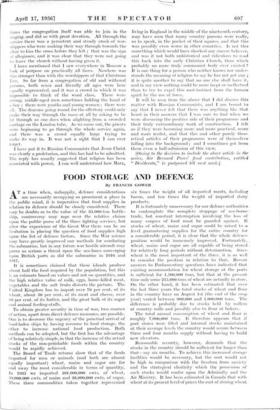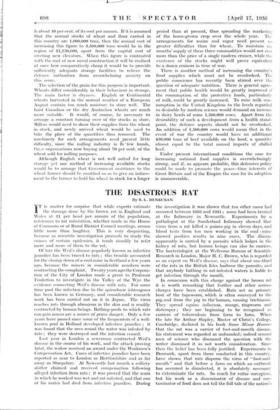FOOD STORAGE AND DEFENCE
By FRANCIS GOWER 1917. • It. is sometimes claimed that these islands produce about half. the food required by the population, but this is an estimate based on values and not on quantities, and the -high relative value of milk, eggs, home-killed meat, vegetables •and the soft fruits distorts the picture. The United Kingdom has to import over 70 per cent. of its wheat, about 50 per cent. .of its meat and cheese, over 80 per cent. of its butter, and the great bulk of its sugar and animal feeding-stuffs.
To obtain greater security in time of war, two courses of action, apart from direct defence measures, are possible. One is to decrease the urgency of the punctual arrival of food-laden ships by having recourse to food storage, the other to increase national food production. Both methods can be adopted, but the first has the advantage of being relatively simple, in that the increase of the actual stocks .of the non-perishable foods within the country would be rapidly achieved.
The Board of Trade returns show that of the foods imported for men or animals (and both are almost equally important) wheat, maize and sugar are far and away the most considerable in terms of quantity. In 1935 we imported 101,000,000 cwts. of wheat, 59,000.000 cals. of maize and 38,000,000 cwts. of sugar. These three commodities taken together represented six times. the weight of all imported meats, including bacon, and ten times the weight of imported dairy products.
It is -fortunately unnecessary for our defence authorities. to contemplate the -complete stoppage of sea-borne trade, but constant interruption involving the loss of many cargoes of food must be guarded against. If stocks of wheat, maize and sugar could be raised to a level guaranteeing supplies for the entire country Thr a considerable period, it is clear that the whole defence position would. he immensely improved. Fortunat ely, wheat, maize and sugar are all capable of being stored.; for relatively long periods without deterioration. Since.•.
wheat is the most important of the three, it is as well to consider the position in relation to that. Recent answers to Parliamentary questions have indicated that existing accommodation for wheat storage at the ports is sufficient for 1,500,000 tons, but that at the present time only some 215,000 tons of wheat are actually in store. On the other hand, it has been estimated that over the last three years the total stocks of wheat and flour in the country have on August 1st (the end of the crop year) varied between 900,000 and 1,000,000 tons. The difference is probably due to stocks held by millers at country mills and possibly also to flour at bakers.
The total annual consumption of wheat and flour is roughly 7,000,000 tons. It therefore appears that if port stores were filled and internal stocks maintained at their average levels the country would secure between three and four months supply without having to build new elevators.
Reasonable security, however, demands that the stocks in the country should be sufficient for longer than that—say six months. To achieve this increased storage facilities would be necessary, but the cost would not be high in comparison with the freedom from anxiety and the strategical elasticity which the possession of such stocks would confer upon the Admiralty and the Air Ministry. It has been estimated in Canada that with wheat at its present level of prices the cost of storing wheat is about 10 per cent. of its cost per annum. If it is assumed that the normal stocks of wheat and flour carried in this country are 1,000,000 tons, then the annual cost of increasing this figure to 3,500,000 tons would be in the region of £1,150,000, apart from the capital cost of erecting new elevators. When this figure is contrasted with the cost of new naval construction it will-be realised at once how comparatively cheap it would be to provide sufficiently adequate storage facilities to relieve the defence authorities from overwhelming anxiety on this score.
The selection of the grain for this purpose is important. Wheats differ considerably in their behaviour in storage. The main factor is dryness. English or Continental wheats harvested in the normal weather of a European August contain too much moisture to store well. The hard Canadian or the dry Australian wheats are much more suitable. It would, of course, be necessary to arrange a constant turning over of the stocks in store. Millers would need to draw their supplies from the wheat in stock, and newly arrived wheat would be used to take the place of the quantities thus removed. The machinery for such arrangements need present little difficulty, since the milling industry is Ph few hands, thrce organisations now buying about 70 per cent. of the wheat sold for milling purposes.
Although English wheat is not well suited for long storage yet one method of increasing available stocks would be to arrange that Government assistance to the wheat farmer should be modified so as to give an induce- ment to the farmer to hold his wheat in stack for a longer period than at present; thus spreading the marketing of the home-grown crop over the Whole year. The arrangements for maize and sugar need present no greater difficulties than for wheat. To maintain six months' supply of these three commodities would not cost more than the price of a single modern cruiser, while the existence of the stocks might well prove equivalent to a dozen cruisers in time of war.
There is another method of increasing the country's food supplies which must not be overlooked. The public conscience has recently been stirred over the question of adequate nutrition. There is general agree- ment that public health would be greatly improved if the consumption of the protective foods, particularly of milk, could be greatly increased. To raise milk con- sumption in the United Kingdom to the levels regarded as desirable by modern science would demand an increase in dairy herds of some 1,500,000 cows. Apart from the desirability of such a development from a health stand- point, the defence aspects should not be overlooked. An addition of 1,500,000 cows would mean that in the event of war the country would have an additional 450,000 tons of beef available on the hoof, a quantity almost equal to the total annual imports of chilled beef.
Under present international conditions the case for increasing national food supplies is overwhelmingly strong, and if, as appears probable, this defensive policy could be made to promote the peace-time interests of Great Britain and of the Empire the case for its adoption is unanswerable.













































 Previous page
Previous page